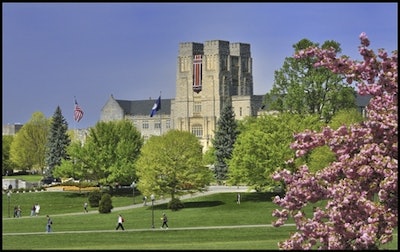Eschewing one-size-fits-all, the dean of Virginia Tech Graduate School has developed an inclusion/diversity requirement that will enable programming to fit departmental needs.
“Karen DePauw’s leadership has significantly advanced graduate education at Virginia Tech and in the higher education community more broadly,” says Dr. Suzanne T. Ortega, president of the Council of Graduate Schools. “Karen’s life-long commitment to a diverse and inclusive graduate community is evident in her many accomplishments and sets of standards to which many aspire.”
 Dr. Karen P. DePauw
Dr. Karen P. DePauwWhen Dr. Karen P. DePauw arrived at Virginia Polytechnic Institute and State University (Virginia Tech) Graduate School in 2002, she was intent on building a strong, diverse and inclusive graduate community. As the vice president and dean for graduate education, her vision was to implement Transformative Graduate Education (TGE).
“I wanted … to create opportunities for the graduate students to be better prepared for wherever it is that they are going,” says DePauw. “I adopted the theme of a 21st century university, and that approach meant that it had to be inclusive, affirming, diverse.”
That vision might never have come to be when Virginia Tech’s Board of Visitors refused to hire DePauw’s partner, Dr. Shelli Fowler, even though she had been approved by the English department.
“We made the decision that we’re going to face them, so we moved to Virginia Tech and then created opportunities for activism,” says DePauw. Fowler was eventually hired. “That was an example of how one can stand by the principles and values of social justice. I think that helped others at the university see that it was possible for the university to be more inclusive.”
Over the past 17 years, DePauw’s vision has evolved as needs have changed. The Graduate Life Center (GLC), which provides services to meet the needs of graduate students, has received national recognition.
“It’s a continuous process from my perspective because society keeps changing,” says DePauw. “We need to be preparing people for change and to be change agents.”
Little Hokie Hangout, a childcare cooperative, is something DePauw sees as essential in an inclusive environment. There are conveniently located counseling services and a wellness space, where students can grab a nap or some quiet time. Accessibility for physically disabled students is critical.
TGE began with the mission of preparing the future professoriate. It expanded to include a citizen scholar program, in which students engage with society. More recently, programs have been developed with an emphasis on community science, and the graduate school propelled development of Virginia Tech’s Center for Communicating Science. DePauw also developed programming that emphasizes the skills and abilities needed to work outside of academia.
 Virginia Tech
Virginia TechDePauw likes to put the word inclusion before diversity because “if we are inclusive, there will be diversity,” she says. “When we build environments, climates and opportunities, they need to be inclusive so the diverse voices and perspectives will be there and be valued for what they bring.”
Diversity extends vastly beyond racial and ethnic diversity. At the graduate school. there are military veterans, adult learners, people with physical disabilities and international students. Dr. Shernita Lee, assistant dean and director, office of recruitment, diversity and inclusion, says DePauw welcomes ideas and encourages discussion.
Recruitment, inclusion/diversity and retention interact regularly and DePauw is kept abreast of pressing issues. She sees recruitment and retention as interconnected and says it is crucial all students feel welcome. The office of the ombudsperson is a confidential place where graduate students can go for advice and to voice concerns or complaints. DePauw is proud of Disrupting Academic Bullying, a website with support services that address a common but often unspoken graduate school problem.
There is a diversity scholars program. At least once a month there are “connect lunches” open to all graduate students that DePauw makes a point to attend. “It’s absolutely critical that the dean be there … demonstrating my commitment to them,” she says.
The graduate schools hosts HBCU/MSI research summits, bringing faculty in from various institutions with an eye toward developing partnerships.
DePauw and Lee each teach a course titled Diversity/Inclusion in a Global Society. Graduate students create projects about things they would change in their departments or what they see as a need in the graduate community. They can earn a certificate in diversity and inclusion. A recently approved inclusion/diversity requirement, driven by DePauw, will roll out this fall and must be fully implemented by 2022.
“The departments have to come up with ways to focus on our principles of community and policies we have that stand against discrimination and bias,” says Lee. “They have to incorporate that through their regular programming. … That way, each department can think about what they can do. Great conversations are happening.”
DePauw is regularly called upon to speak on topics of inclusion and diversity at conferences and workshops. Virginia Tech has twice put on conferences attended by other graduate schools seeking to learn about student services.
“I want people to look at what we’ve done,” says DePauw. “I encourage and actively work with other grad schools to develop programs like [the GLC].”
This article appeared in the Aug. 22 issue of Diverse.















